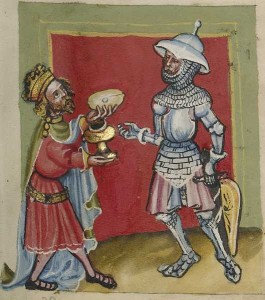 The story of the Eucharist starts in Genesis. The Tree of Life is a prototype for the Eucharist, but it only offers immortality on earth. The fulfillment of this sign provides the eternal life of the Son of God. We see in Genesis Abraham’s encounter with Melchizedek and the promise that God will provide the lamb for the sacrifice in place of Isaac. Both of these point to the Eucharist.
The story of the Eucharist starts in Genesis. The Tree of Life is a prototype for the Eucharist, but it only offers immortality on earth. The fulfillment of this sign provides the eternal life of the Son of God. We see in Genesis Abraham’s encounter with Melchizedek and the promise that God will provide the lamb for the sacrifice in place of Isaac. Both of these point to the Eucharist.
The Scripture passages are taken from the New American Bible. The full text of this translation is available on the Vatican’s website.
Scripture passages in Genesis pointing to the Eucharist:
- The Tree of Life
- Genesis 2:7-9 – Tree of Life
- Genesis 3:22-24 – Loss of the Tree of Life
- Melchizedek
- Genesis 14:18-20 – Melchizedek
- Psalm 110 – Melchizedek
- Genesis 22:1-8 – Abraham and Isaac
- Genesis 49:8-12 – Jacob’s prophesy of Judah
The Tree of Life
Genesis 2:7-9
The LORD God formed man out of the clay of the ground and blew into his nostrils the breath of life, and so man became a living being. Then the LORD God planted a garden in Eden, in the east, and he placed there the man whom he had formed. Out of the ground the LORD God made various trees grow that were delightful to look at and good for food, with the tree of life in the middle of the garden and the tree of the knowledge of good and bad.
Genesis 3:22-24
Then the LORD God said: “See! The man has become like one of us, knowing what is good and what is bad! Therefore, he must not be allowed to put out his hand to take fruit from the tree of life also, and thus eat of it and live forever.” The LORD God therefore banished him from the garden of Eden, to till the ground from which he had been taken. When he expelled the man, he settled him east of the garden of Eden; and he stationed the cherubim and the fiery revolving sword, to guard the way to the tree of life.
The fruit of the Tree of Life is the prototype for the Eucharist. The fruit hangs on the tree and gives life. This is an image of Christ. Jesus is the fruit that gives life from the tree that is the cross.
The fruit of the tree of life was imperfect. It provided immortality on earth, but not eternal life in heaven with God. The Eucharist gives the fulfillment and perfection of the fruit of the tree of life. We are made for eternal joy and love in heaven in union with the Father, Son and Holy Spirit. Through the Eucharist, we can receive this gift of love and unity.
Immediately after creating man by breathing life into him, God gives the tree of life. It is from the first moment of creation that God gives the sign pointing to the Eucharist. We were made to share in the life of Jesus through the Blessed Sacrament.
After the fall, Adam and Eve lose access to the tree of life. They have separated themselves from God through sin. The sign that pointed to the Eucharist is taken from them. Their sin has made them unworthy and unable to receive the life of God. It is only through the sacrifice of Jesus on the cross that the Eucharist is given to us and we are able to bring the life of God into us.
When the tree of life is taken from Adam and Eve, Cherubim were stationed to guard the way back. The Cherubim are one of the highest levels angels and it is from their ranks that the guards for the sign pointing to the Eucharist are drafted. This can help us understand how important the Eucharist is. Any angel is sufficiently powerful to stop us. The weakest angel has strength that makes any army on earth look insignificant. So, why choose from the Cherubim?
One reason is to highlight that we cannot overcome what God put between us and the tree of life. That’s a good reason, but perhaps more significant is that the tree of life is a symbol pointing to the Eucharist. The Eucharist is so magnificent that even a sign or symbol that God gives is worthy of tremendous respect. If the tree of life is guarded by Cherubim, how much more should we respect and revere the Eucharist that is the fulfillment of that sign?
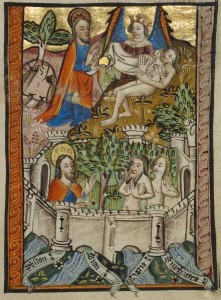
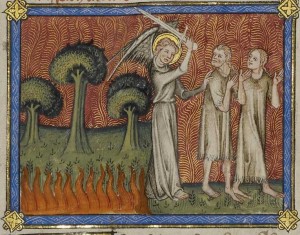
Melchizedek
Genesis 14:18-20
Melchizedek, king of Salem, brought out bread and wine, and being a priest of God Most High, he blessed Abram with these words: “Blessed be Abram by God Most High, the creator of heaven and earth; And blessed be God Most High, who delivered your foes into your hand.” Then Abram gave him a tenth of everything.
Psalm 110:1-4
A psalm of David. The LORD says to you, my lord: “Take your throne at my righthand, while I make your enemies your footstool.” The scepter of your sovereign might the LORD will extend from Zion. The LORD says: “Rule over your enemies! Yours is princely power from the day of your birth. In holy splendor before the daystar, like the dew I begot you.” The LORD has sworn and will not waver: “Like Melchizedek you are a priest forever.
Melchizedek is described as a priest and a king. He is the first priest mentioned in the Bible, and he offers the first priestly sacrifice recorded in the Bible. The sacrifice is a prototype for the Pascal Sacrifice.
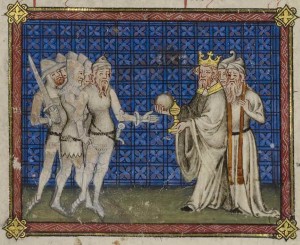 Melchizedek offers bread and wine for his sacrifice. This is a sign pointing to the gift of the Eucharist. Jesus fulfills this by offering His body and blood under the appearance of bread of wine.
Melchizedek offers bread and wine for his sacrifice. This is a sign pointing to the gift of the Eucharist. Jesus fulfills this by offering His body and blood under the appearance of bread of wine.
For one thousand years, from the time of Melchizedek until the time Psalm 110 was written by David, the humble sacrifice of bread and wine was remembered. It is extraordinary the descendants of Abraham carried this memory for so long. It survived four hundred years of slavery in Egypt, 40 years in the desert, and the time of the judges. They had no idea that the sacrifice pointed to the Eucharist, the greatest gift that was ever given, but they remembered it and passed it on to each new generation.
Abraham was the great patriarch of Israel, and the sacrifice offered in thanksgiving for his victory is a simple, humble sacrifice. Over a thousand years, no one changed the story to embellish it. Wouldn’t a sacrifice of a dozen bulls, numerous sheep and goats, and other animals sound more impressive? Of course it would, but that’s not what was passed down. Alternatively, with how small and humble the sacrifice was, it is incredible that this story was remembered at all. This seems to be the work of the Holy Spirit preserving the story intact without embellishment that would detract from its purpose to point to Christ and the Eucharist.
Genesis 22:1-8 – Abraham and Isaac
Some time after these events, God put Abraham to the test. He called to him, “Abraham!” “Ready!” he replied. Then God said: “Take your son Isaac, your only one, whom you love, and go to the land of Moriah. There you shall offer him up as a holocaust on a height that I will point out to you.” Early the next morning Abraham saddled his donkey, took with him his son Isaac, and two of his servants as well, and with the wood that he had cut for the holocaust, set out for the place of which God had told him. On the third day Abraham got sight of the place from afar. Then he said to his servants: “Both of you stay here with the donkey, while the boy and I go on over yonder. We will worship and then come back to you.” Thereupon Abraham took the wood for the holocaust and laid it on his son Isaac’s shoulders, while he himself carried the fire and the knife. As the two walked on together, Isaac spoke to his father Abraham. “Father!” he said. “Yes, son,” he replied. Isaac continued, “Here are the fire and the wood, but where is the sheep for the holocaust?” “Son,” Abraham answered, “God himself will provide the sheep for the holocaust.” Then the two continued going forward.
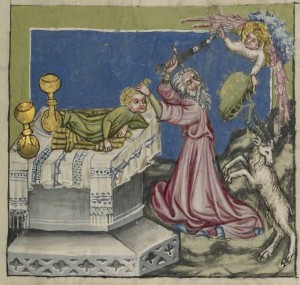 Abraham is asked to prove his love for God by obeying an astounding request. He must sacrifice his beloved son. Abraham would have needed incredible trust in God. His love for God had to have been even greater. This points to the great love the Father has for us. He gave us His only beloved Son to be sacrificed for us, and He did this freely.
Abraham is asked to prove his love for God by obeying an astounding request. He must sacrifice his beloved son. Abraham would have needed incredible trust in God. His love for God had to have been even greater. This points to the great love the Father has for us. He gave us His only beloved Son to be sacrificed for us, and He did this freely.
Abraham traveled three days to sacrifice his son. He had to think about what he was being asked to do. This was not a spontaneous action, but deliberate and thoroughly considered. For three days, his son was no longer his. With every step Abraham took toward Mt. Moriah, he knew he moving closer to sacrificing his son. This is an image of Jesus anticipating His death in the days leading up to the crucifixion and especially in the garden just before His arrest. It is also an image of Jesus patiently waiting in the tomb until His resurrection on the third day.
Mt. Moriah is the name for the mountain range around Jerusalem. Abraham is asked to sacrifice Isaac on a hill that could be where the Temple would be built. It also could be Calvary where Jesus was crucified. We can’t know the exact location, but the sacrificial altar built by Abraham is in the same location as Christ’s sacrifice for us.
Abraham is a very old man, over 100 years old. Isaac is a teen, probably around fifteen. At some point, Isaac understood what his father was doing. He knew that they had everything for the sacrifice but the sacrificial victim. Human sacrifice was common at the time, and Isaac seems to have figured out that he would be sacrificed. Isaac would have been much stronger than Abraham due to Abraham’s age. Abraham’s obedience to God is incredible, but so is Isaac’s obedience to his father. Isaac could have refused and fought his father. He doesn’t. It is an image of the obedience of Jesus to follow the Father’s will perfectly.
Abraham predicts that God will provide the sheep for the sacrifice. When God stays Abraham’s hand, a sheep is found to be sacrificed, but this is not the fulfillment of the prophecy. It is Jesus, the Lamb of God, that is provided by God the Father to fulfill the promise for the sacrifice. Jesus is the perfect sacrifice offered for our salvation.
Christ’s sacrifice comes to us in the Eucharist. We received the sacrificed Jesus’ body and blood in the Blessed Sacrament.
Genesis 49:8-12 – Jacob’s prophesy of Judah
“You, Judah, shall your brothers praise – your hand on the neck of your enemies; the sons of your father shall bow down to you. Judah, like a lion’s whelp, you have grown up on prey, my son. He crouches like a lion recumbent, the king of beasts – who would dare rouse him? The scepter shall never depart from Judah, or the mace from between his legs, While tribute is brought to him, and he receives the people’s homage. He tethers his donkey to the vine, his purebred ass to the choicest stem. In wine he washes his garments his robe in the blood of grapes. His eyes are darker than wine, and his teeth are whiter than milk.”
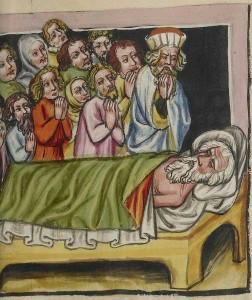 Jacob makes a prophecy at the end of his life for each of his sons. This is done in Egypt, and at the time, Joseph is a high-ranking official for pharaoh and Jacob and all his sons have moved to Egypt.
Jacob makes a prophecy at the end of his life for each of his sons. This is done in Egypt, and at the time, Joseph is a high-ranking official for pharaoh and Jacob and all his sons have moved to Egypt.
The prophecy for Judah is that he will be praised by his brothers. This is very unexpected. He was not the firstborn, that was Reuben. He was not the most powerful at the time of the prophecy – that was Joseph. Despite Judah’s position, Jacob predicts that Judah will be praised above his brothers.
The prophecy is full of kingly images. At the time, Jacob likely did not imagine a kingdom for his family. They were just a large family in Egypt. The imagery pointed to the leadership of Judah and his descendants in the kingdom of Israel.
The blood of grapes is an amazing phrase. It images the Eucharist so well. Jacob could not have imagined the Eucharist, and yet described it wonderfully. Jesus, the descendant of Judah, washed all of us in His blood changed from wine.
In Revelation (ch 7), the great multitude is described as wearing white robes washed in the blood of the Lamb. This image is reminiscent of Jacob’s prophecy. It is the blood the grapes, the wine changed into the blood of Christ, shed for us on Calvary that cleanses us from the stain of sin.
Images:
Unknown, The Blessing of Melchizedek, about 1400 – 1410, Tempera colors, gold, silver paint, and ink on parchment, Leaf: 33.5 x 23.5 cm (13 3/16 x 9 1/4 in.), The J. Paul Getty Museum, Los Angeles
Unknown, The Garden of Eden, illumination about 1190; written about 1490, Tempera colors and gold leaf on parchment, Leaf: 11.9 x 17 cm (4 11/16 x 6 11/16 in.), The J. Paul Getty Museum, Los Angeles
Master of Jean de Mandeville (French, active 1350 – 1370), The Expulsion from Paradise, about 1360 – 1370, Tempera colors, gold, and ink on parchment, Leaf: 34.9 x 26 cm (13 3/4 x 10 1/4 in.), The J. Paul Getty Museum, Los Angeles
Master of Jean de Mandeville (French, active 1350 – 1370), Abraham and Melchizedek, about 1360 – 1370, Tempera colors, gold, and ink on parchment, Leaf: 34.9 x 26 cm (13 3/4 x 10 1/4 in.), The J. Paul Getty Museum, Los Angeles
Unknown, The Sacrifice of Isaac, about 1400 – 1410, Tempera colors, gold, silver paint, and ink on parchment, Leaf: 33.5 x 23.5 cm (13 3/16 x 9 1/4 in.), The J. Paul Getty Museum, Los Angeles
Unknown, The Death of Jacob, about 1400 – 1410, Tempera colors, gold, silver paint, and ink on parchment, Leaf: 33.5 x 23.5 cm (13 3/16 x 9 1/4 in.), The J. Paul Getty Museum, Los Angeles